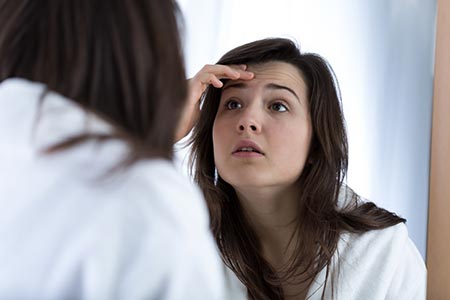Whether your mom or dad claims to have the perfect home remedy, or your friend swears by a trendy new product, the hard truth is there are no silver-bullet treatments to cure teenage acne.

Hormone changes stimulate acne, which is why teens experience breakouts more intensely than other age groups.
What is acne?
“Acne is a common skin condition where pores get clogged with oil, dead skin cells and bacteria,” said Dr. Elizabeth Ethington, Marshfield Clinic Health System dermatologist.
Whether acne shows up as blackheads, whiteheads or something more severe depends on the body’s response to the acne.
“Acne always starts out as a blocked pore,” Dr. Ethington said. “But if it gets inflamed, it can form the deeper painful acne cysts.”
Why do teens experience acne so intensely?
“Acne is a hormone-driven process,” Dr. Ethington noted. “The increase and changes in hormones during puberty increases oil gland production, making pores more susceptible to becoming clogged.”
Acne peaks in adolescence and early adulthood, most commonly between the ages of 12 and 24. It usually affects girls a little earlier than boys.
Can it be serious?
Teenage acne rarely gets more serious than a pimple showing up right before prom, but it can have more severe consequences.
“In some patients, acne can become very inflamed, large and painful,” said Dr. Ethington. “That can result in lifelong scarring. There are also some rare types of acne that can cause internal symptoms with fever and joint pain.”
Stick with the basics for acne treatment
Dr. Ethington discourages teens from squeezing or popping pimples because doing so can result in slower healing, infections and scarring. She also cautions parents and teens to be wary of expensive acne cures, and home remedies you may find on the internet.
“I recommend starting with gentle skin care, using a mild soap,” Dr. Ethington said. “You can also try over-the-counter products that contain either benzoyl peroxide or salicylic acid. But please avoid extensive at-home treatments.”
All acne treatments take four-to-eight weeks to see improvement. If those things don’t work, consulting a dermatologist is a sensible next step.
For acne help, talk to a Marshfield Children’s provider.
Schedule appointment Message your provider
Related Shine365 articles
Is it adult acne or is it something else?
Toxic shock syndrome symptoms and treatments
Help stressed teens manage busy schedules
Skin infections in athletes: Herpes simplex, impetigo, MRSA, ringworm and molluscum contagiosum


My 21-year-old son's family physician put him on doxycycline. How long should a patient be on this, and if they go off, will the acne come back?
Hi, Jayne. We cannot provide individualized medical advice on this forum. However, in discussing doxycycline with Dr. McIntee in general, patients typically use this medication for a few months, and then should have a repeat visit with their doctor to assess efficacy. With any medication, it’s important to have regular appointments with a specialist (in this case, your son’s physician) so they can monitor whether the medicine is working or creating any adverse affects.
Please discuss these specific questions and concerns with your son’s physician. If you have My Marshfield Clinic, you can message the provider there: https://www.marshfieldclinic.org/MyMarshfieldClinic -Kirstie
Thank you for your response